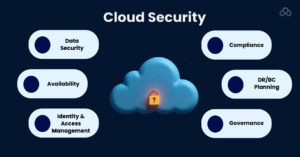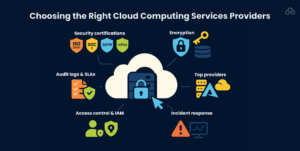In today’s high-tech world, cloud computing is no longer a want but it’s a necessity. Both small and huge businesses are shifting to the cloud to store data to run applications, and streamline operations. The flexibility, scalability, and cost-effectiveness of cloud platforms are just amazing enough to ignore. However, with this change comes a major concern- data security. When sensitive business data go beyond traditional firewalls and into virtual environments, ensuring its safety should be important.
Violations like cyberattacks, data breaches, are rising. A single data leak can damage the brand reputation and cost millions, and also break customer trust. Therefore, it’s important for the organizations to take cloud security seriously. In this blog, we’ll explore how cloud computing essential unlock benefits for data security. We’ll also go into the hybrid cloud benefits, the importance of DevOps managed services, and how choosing the right cloud computing services providers can make a big difference.
Why Data Security in the Cloud Is Different

Unlike traditional IT systems, the cloud computing essential unlock benefits are dynamic and decentralized. This means your data could be stored across multiple servers in different regions or even countries. In traditional setups, you can physically lock a server room. But in the cloud, you depend on virtual security tools and protocols. This change brings along specific security challenges like remote access, multi-tenancy, shared responsibility, and constantly evolving cyber violations.
Hackers are becoming advanced, and insider threats are not uncommon. Businesses need to go beyond the regular and adopt advanced security practices customized for the cloud. That’s where understanding cloud essentials becomes crucial.
Cloud Computing Essential Unlock Benefits for Security
Modern cloud platforms come with pre-built features that give strong protection if configured correctly. These cloud computing essential unlock benefits in many ways.
First, there’s data encryption. Cloud providers encrypt data both at rest and during transmission. This ensures that even if attackers get access to data, they can’t read it without the encryption key. So, you can also use customer-managed keys for additional control.
Next, Identity and Access Management (IAM) plays a specific role. IAM tools allow businesses to define who can access what. By using techniques like multi-factor authentication (MFA) and role-based access control (RBAC), organizations can limit the access and reduce the chances of unauthorized usage.
Another key is automated monitoring and alerts. Cloud platforms monitor user behavior and generate real-time alerts if something suspicious happens. For example, if someone tries to download thousands of files at once, the system can raise a flag and block the action automatically.
In addition, backup and disaster recovery solutions in the cloud are automated and fast. Even in the event of a cyberattack or accidental deletion, your data can be restored quickly with less disruption.
The Shared Responsibility Model
One of the most misunderstood aspects of cloud security is the shared responsibility model. Many businesses think that since their data is on the cloud, the cloud computing essential unlock benefits will take care of everything. But that’s not the case.
In reality, the cloud providers are responsible for securing the infrastructure like- servers, networking, and storage. Meanwhile, the business is responsible for securing data, access, and workloads on that infrastructure. This includes managing user permissions, encrypting data, and ensuring compliance with regulations like GDPR or HIPAA.
Understanding and following these models is important to preventing security gaps. Many breaches happen not just because of provider failure but due to user misconfigurations or weak access controls.
Hybrid Cloud Computing Essential Unlock Benefits
As businesses grow, they adopt a hybrid cloud benefits that is combining public cloud services with private or on-premise infrastructure. This model offers flexibility and helps businesses to manage workloads efficiently. But what about the security?
Hybrid clouds provide a specific advantage: control and flexibility. Sensitive or regulated data can be on a private cloud, while less critical services run on the public cloud. This way, businesses can maintain control over their most valuable data while still working on the scalability of the public cloud.
Another benefit is compliance. With hybrid cloud, companies can choose where their data is, which helps meet legal requirements around data sovereignty and privacy.
Additionally, business continuity is improved. In case of a failure or attack in one environment, the other can have its back. This resilience ensures operations aren’t stopped completely during a crisis.
However, hybrid environments must be nicely integrated and monitored. Secure APIs, encryption protocols, and uniform policies should ensure smooth and safe data flow between environments.
DevOps Managed Services: Securing Fast-Paced Development
With the great use of cloud computing essential unlock benefits, many companies also use DevOps for faster software development. But moving fast should not come at the cost of security. That’s where DevOps managed services come into the picture.
DevOps teams today are shifting toward DevSecOps that’s an approach which builds security into the cloud development pipeline. Security checks are done at every stage, from code commit to deployment. This proactive approach ensures that vulnerabilities should be caught before, reducing the risk of breaches in production environments.
Another benefit is the use of Infrastructure as Code (IaC). This method allows teams to define infrastructure in code, which makes configurations consistent and repeatable. Any security bugs in infrastructure can be caught before deployment using automated scans.
Monitoring and logging are also stronger in DevOps setups. Tools like Prometheus, ELK stack, and Datadog help to track metrics, detect anomalies, and generate alerts. DevOps managed services help businesses to adopt and maintain these tools without needing in-house experts.
Choosing the Right Cloud Computing Services Providers

Not all cloud computing services providers give the same level of security. While selecting a provider, security should be a top priority. Look for certifications like- ISO 27001, SOC 2, and compliance with GDPR, HIPAA, or PCI-DSS, that depends on your industry.
Ask about their data encryption practices like access control mechanisms, and incident response plans. Ensure that they provide detailed audit logs, service-level agreements (SLAs), and support for customer-managed encryption keys.
Some top providers like Amazon Web Services (AWS), Microsoft Azure, and Google Cloud give a wide range of security services. However, these tools must be used correctly. For example, AWS offers GuardDuty for threat detection and IAM for access control, but it’s up to the user to configure and manage them properly.
Best Practices for Cloud Data Security
Now that we’ve covered the tools and concepts, let’s look at usable best practices that organizations should follow to keep their cloud environments safe.
First, always encrypt your data– both at rest and in transit. This ensures that even if attackers get your files, they can’t read them.
Second, use a least privilege access model. This means users should only have access to the data and tools they need. Regularly review and update access permissions.
Third, implement multi-factor authentication (MFA). A strong password isn’t extra anymore. MFA adds an extra step of security which protects against stolen credentials.
Fourth, conduct regular security audits and penetration testing. These tests help you to find and fix vulnerabilities before attackers do.
Fifth, establish a disaster recovery plan. Backups should be automatic and stored securely. Test your recovery plan periodically to make sure it works during a real crisis.
Lastly, train your employees. Human error is one of the biggest causes of data breaches. Train your team on phishing attacks, password hygiene, and secure file sharing.
Final Thoughts
It continues to evolve how businesses operate. The scalability, agility, and cost savings it offers are amazing. However, these benefits can only be fully used when data security is treated as a top priority.
By focusing on cloud computing essentials that unlock benefits, using hybrid cloud models wisely, leveraging DevOps managed services, and partnering with trusted cloud computing services providers where businesses can build a strong cloud environment that supports growth without any sacrifice.
Lastly, cloud security isn’t just about technology. It’s about having the right people, processes, and policies in place. When all these elements come together, your business can get the full promise of the cloud safely and confidently.
FAQs
1. What are cloud computing essentials unlocking benefits for data security?
Cloud computing essential unlock benefits include encryption, identity and access management, monitoring, automatic backups, and regular updates. These elements help to protect data from unauthorized access and cyber threats.
2. How does a hybrid cloud improve security?
Hybrid cloud offers control and flexibility. You can keep sensitive data on a private cloud and use the public cloud for other workloads, helping manage compliance and improve data protection.
3. What role do DevOps managed services play in cloud security?
DevOps managed services help integrate security into the software development process through tools, automation, and infrastructure as code. This improves consistency, speed, and safety.
4. Who is responsible for data security in the cloud?
Security in the cloud follows a shared responsibility model. Cloud providers secure the infrastructure, while users are responsible for data, access, and configurations.
Do you like to read more educational content? Read our blogs at Cloudastra Technologies or contact us for business enquiry at Cloudastra Contact Us.